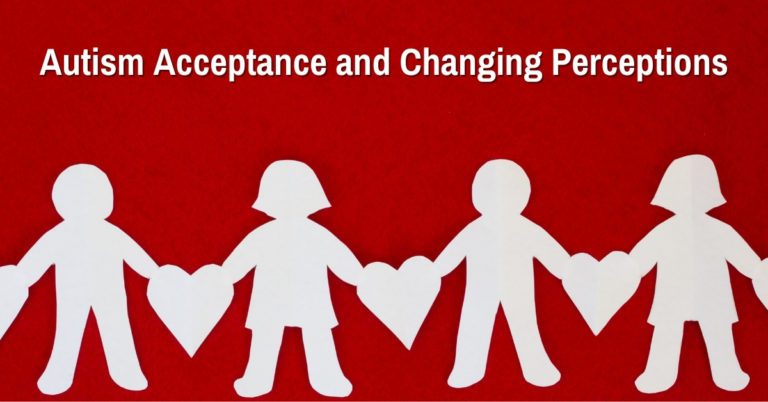
As we kick off what we – and many others – call Autism Acceptance Month, we want to be a part of shifting the narrative when it comes to autism. As we shared in the past, many people are “aware” of autism. But how well do they know and accept individuals with autism as a part of our schools, workplaces and communities?
The Need for Changing Perceptions
Some of us may have preconceived ideas when it comes to autism, or any disability or thing that may be unfamiliar to us. As a result, we want to focus on helping to change some of those perceptions. We reached out to professionals who know a lot of autistic children and teens to get their perspective on this. We asked them to share a word that comes to mind when they think of autism and the individuals they work with.
And what they shared with us is inspiring! We heard from ABA Therapists and Registered Behavior Technicians, BCBAs, Occupational Therapists and Speech Pathologists. All these words and phrases were provided independently, so no one knew what other team members shared. We hope these descriptions help shift your perspective to look at autistic individuals in a broader light. Doing so will help move us toward autism acceptance, seeing their strengths and unique qualities they bring to our world.
Creative
Creativity and creative were a dominant theme in the words our staff chose to describe the children and teens they work with.
One of our BCBA’s said our clients are “creative problem solvers.” “I feel like our kids come up with some of the most genius ways to complete a task and solve a problem that I’ve ever seen. I think the rest of us can be too ‘in the box’ and our kids show us there are a million different ways to do something,” explained Julie.
One of our Occupational Therapists used these phrases that describe the same idea: “outside-the-box thinkers” and “inventive.” Couldn’t we all use some fresh new ways to approach life’s challenges?
Communicative
It can be quite common for autistic individuals to struggle with communication. Some of our clients are non-verbal and use a different form of communication like an AAC (Assistive Augmentative Communication) device. Others communicate verbally but may find it challenging to express their needs and feelings, or in reading social communication cues.
“Whether they are happy, upset, don’t feel good, or need some love, I think our clients are always communicating,” explained one of our BCBA’s, Jerry. “Even though the way they communicate isn’t always like others, each individual communicates certain things in their own way.”
Jerry went on to explain, “Behavior is communication. This way of thinking has forced me to tune into my clients as much as I can. This helps me to truly understand their needs, preferences, etc. I try to keep that in mind so I can meet my clients where they are.”
Joyful
A common stereotype of autistic individuals is that they are not able to express their emotions. However, if you spend just a few minutes with a handful of kids or teens on the spectrum, you will find this is not the case. Several of our staff members used words like “joy,” “joyful,” and “joy-radiating,” as well as “affectionate,” and “cheer-spreaders” to describe the individuals they work with.
Who could not use a bit more joy in your life? Maybe spending some time with someone on the spectrum could help you be more joyful.
Intelligent
Many of our team members shared words like “brilliant,” “intelligent” and “perceptive.” So often our society focuses on traditional forms of intelligence like a person’s ability to do math calculations or their reading level. But there is so much more to intelligence than book smarts. Let’s learn to look at the other ways individuals display their strengths and abilities.
Superhero
One of our Speech Pathologists shared the word “superhero.” For many autistic individuals they often have to work harder to acquire every day skills. Whether it is learning how to communicate with those around them, learning how to tie their shoes, or how to follow multi-step directions, there are so many things neurotypical individuals do not think twice about learning to do.
And several other team members shared words that compliment this idea of “superhero.” From “determined” to “brave” and “unstoppable,” to “inspirational” and “limitless” these are special qualities we see in many of the children and teens we work with. Their determination to learn new skills that come much easier to their neurotypical peers is inspiring.
Embracing Autism Acceptance
Have some of these descriptions surprised you? Have some of your perceptions changed? If we are intentional about getting to know individuals on the autism spectrum, we will undoubtedly learn some things from them. So we encourage you if you do not know anyone with autism, be open to it. And encourage your children to be open to getting to know a classmate or peer in their school. They might end up forming a beautiful friendship and in doing so, continue to spread the message of autism acceptance!
